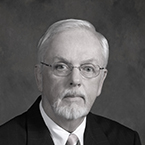
For pioneering research focused on the understanding of molecular endocrinology, gene regulation, and steroid receptor biology that has revealed how intracellular hormones and cofactors function at the DNA level to regulate protein production, affect cellular function, and modulate cancer cell metastasis.
A cancer research luminary, Dr. O’Malley’s is revered for his pioneering research that has focused on the understanding of molecular endocrinology, gene regulation, and steroid receptor biology. Considered the “father of molecular endocrinology,” his work has been instrumental in revealing how intracellular hormones and cofactors function at the genomic level to regulate protein production and affect cellular function. Dr. O’ Malley’s groundbreaking research first demonstrated that nuclear receptors bind to DNA with other proteins forming pre-initiation complexes at initiation sites at promoter regions. In addition, his research group purified the progesterone receptor (PR) and showed distinct allosteric conformational changes in the presence of agonists and antagonists. Dr. O’Malley also demonstrated that steroid hormones have a direct effect on mRNA transcription of downstream targets.
His seminal discovery of the first nuclear receptor coactivator, steroid receptor coactivator 1 (SRC1), elucidated the role of protein cofactors in regulating transcription. Using a yeast two-hybrid system, SRC1 was identified to interact with the ligand binding domain of PR in the presence of progesterone hormone. Dr. O’Malley demonstrated that binding of the co-activator is necessary for full transcriptional activation of the receptor. Furthermore, Dr. O’Malley’s research group went on to characterize SRC1 as a histone deacetylase capable of deacetylating DNA and rendering the genetic material more accessible for transcriptional machinery and the recruitment of general transcription factors to promoter regions. His laboratory has also made critical discoveries with respect to the importance of SRC-2, which has since been shown to be overexpressed in a wide range of cancers and involved in modulation of cancer cell metastasis. His findings have also uncovered that small molecule inhibitors can specifically bind to SRC-3 and lead to the degradation of protein complexes and cancer cell death. These research findings have since led to new avenues of research dedicated to exploring the therapeutic potential of targeting steroid receptor coactivators.
Selected Awards and Honors
2018 Louisa Gross Horwitz Prize, Columbia University, New York, New York
2015 Outstanding Innovation in Science Award, Endocrine Society, Washington, DC
2014 Dale Medal, Society for Endocrinology, Bristol, United Kingdom
2013 Endocrine Regulation Prize, Fondation IPSEN, Paris, France
2011 Ernst Schering Prize, Berlin, Germany
2008 National Medal of Science, National Science Foundation, Washington, DC
2007 Elected Member, Association of American Physicians, Belleville, Michigan
2003 George W. Beadle Award, Genetics Society of America, Rockville, Maryland
2003 Elected Fellow, Royal Academy of Medicine in Ireland, Dublin, Ireland
2001 Antonio Feltrinelli International Prize in Medicine, Accademia Nazionale Dei Lincei, Rome, Italy
1997 Elected Fellow, American Academy of Microbiology, American Society for Microbiology, Washington, DC
1996 Elected Fellow, American Academy of Arts and Sciences, Cambridge, Massachusetts
1995 Elected Fellow, American Association for the Advancement of Science, Washington, DC
1993 Elected Member, National Academy of Medicine, Washington, DC
1992 Elected, National Academy of Sciences, Washington, DC